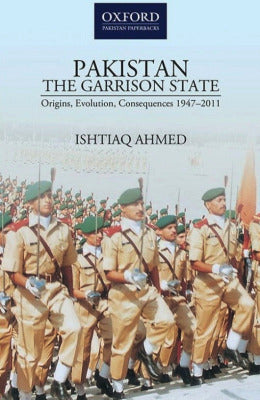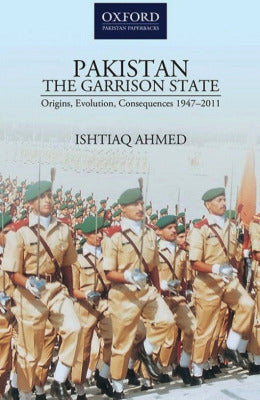THE GARRISON STATE By Ishtiaq Ahmed
THE GARRISON STATE By Ishtiaq Ahmed
PAKISTAN THE GARRISON STATE By Ishtiaq Ahmed
This study seeks to solve the following puzzle: In 1947, the Pakistan military was poorly trained and poorly armed. It also inherited highly vulnerable territory vis-à-vis the much bigger India, aggravated because of serious disputes with Afghanistan. Over the years, the military, or rather the Pakistan Army, continued to grow in power and influence, and progressively became the most powerful institution. Moreover, it became an institution with de facto veto powers at its disposal to overrule other actors within society including elected governments. Simultaneously, it began to acquire foreign patrons and donors willing to arm it as part of the Cold War competition (the United States), regional balance-of-power concerns (China), and ideological contestants for leadership over the Muslim world (Saudi Arabia, to contain Iranian influence). A perennial concern with defining the Islamic identity of Pakistan, exacerbated by the Afghan jihad, resulted in the convergence of internal and external factors to produce the ‘fortress of Islam’ self-description that became current in the early twenty-first century. Over time, Pakistan succumbed to extremism and terrorism within, and was accused of being involved in similar activities within the South Asian region and beyond. Such developments have been ruinous to Pakistan’s economic and democratic development. This study explains how and why it happened.
AUTHOR DESCRIPTION
Ishtiaq Ahmed was born in Lahore on 24 February 1947. He received a PhD in Political Science from Stockholm University in 1986. He taught at Stockholm University from 1987 to 2007, and was then invited as Senior Research Fellow and Visiting Research Professor by the Institute of South Asian Studies, National University of Singapore, during 2007–2010. He is now Professor Emeritus of Political Science, Stockholm University and Honorary Senior Fellow, Institute of South Asian Studies, National University of Singapore. He has published extensively on Pakistani and South Asian politics. His research interests cover fields as diverse as political Islam, ethnicity and nationalism, human and minority rights, and indeed, partition studies.
ISBN 9780190702441
Weight in kg 0.450
Rights World
Year of Publication 2020
Binding Paperback
Pages 508
Product features
Product features
Materials and care
Materials and care
Merchandising tips
Merchandising tips
Share

Sir Book Received, Thanks and Best Wishes
Ishtiaq Ahmed’s book, The Pakistan Garrison State: Origins, Evolution, Consequences (1947 – 2011), is a comprehensive study of the evolution of the country into a garrison state. With this book, Ahmed seeks to explain and contextualize how the Pakistani army rose from its origins as a weak and poorly equipped organization to its status today — as the author argues, “the most powerful institution in the country.”
Ehsan M. Ahrari
Mediterranean Quarterly
Duke University Press
Volume 24, Number 4, Fall 2013
According to Ahmed, the drivers of the political and social rise of the Pakistani army are to be found in a unique mix of real and imagined existential threats to Pakistan during the Cold War, when Pakistan sought totally itself with the United States in order to offset the many security and military advantages enjoyed by India. “Internally,” he writes, “incompetent politicians and their factionalism generated conflict and instability while the civil servants, and later the military, came to represent stability.” Another factor in Pakistan’s emergence as a garrison state, according to Ahmed, is “a lack of clarity on national identity” that drove that country “towards a search for an Islamic identity.”
The chief theoretical basis of Ahmed’s analysis is the garrison state, a concept developed by the eminent American political scientist Harold D. Lasswell. This concept underscores the development of the Pakistani military on the basis of “a peculiar evolution of historical and contemporaneous internal and external factors, as well as religious-cultural and social dimensions.”

